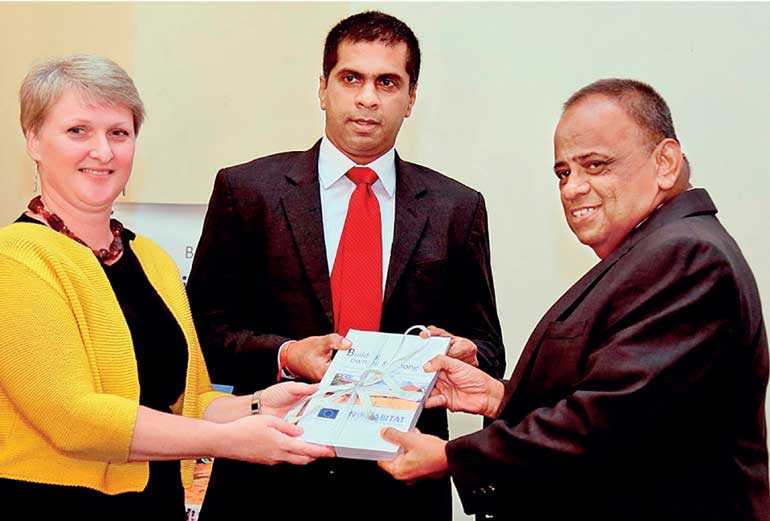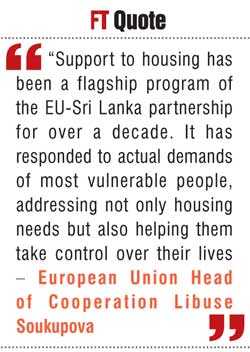Wednesday Feb 25, 2026
Wednesday Feb 25, 2026
Friday, 17 August 2018 00:10 - - {{hitsCtrl.values.hits}}

UN-Habitat Sri Lanka Head of Office Dr. Chanaka Talpahera and Delegation of the European Union to Sri Lanka and the Maldives Head of Cooperation Libuse Soukapova presenting the book to Ministry of Tourism Development and Christian Religious Affairs Secretary Velayuthan Sivagnansothy
The European Union (EU) and UN-Habitat have launched a book titled ‘Building, Owning and Belonging’ about owner-driven housing reconstruction, featuring lessons learnt and good practises from the last three decades till today. The book focuses on Sri Lanka and includes case studies from other countries including India.
Sri Lanka has been internationally recognised for providing ‘homes’ and not just houses since the Million Houses Programme of the 1980s. Ever since, Sri Lanka has demonstrated the value of building together with the active contribution of the people. It has also showcased how effective it is to support local actors with affordable financing and technical assistance geared towards stimulating locally-sourced supply.
 The European Union has been able to build on the success of Sri Lanka’s owner-driven approach to housing reconstruction since 2007. The EU has assisted returnee families to build more than 20,000 houses and another 2,400 are expected to be completed before 2020. The various EU grants to owner-driven housing reconstruction amount to EUR 65 million. Over 40,000 people including female-headed households, families of persons with disabilities and families with missing persons have directly benefitted.
The European Union has been able to build on the success of Sri Lanka’s owner-driven approach to housing reconstruction since 2007. The EU has assisted returnee families to build more than 20,000 houses and another 2,400 are expected to be completed before 2020. The various EU grants to owner-driven housing reconstruction amount to EUR 65 million. Over 40,000 people including female-headed households, families of persons with disabilities and families with missing persons have directly benefitted.
Speaking on the occasion of the book launch, the Head of Cooperation Libuse Soukupova said, “Support to housing has been a flagship program of the EU-Sri Lanka partnership for over a decade. It has responded to actual demands of most vulnerable people, addressing not only housing needs but also helping them take control over their lives. Different forms of assistance to households and in particular support to women in the process of reconstruction have led to more resilient communities. We feel privileged for having accompanied people of Sri Lanka in re-habilitating their villages in their own meaningful ways.”
The book provides evidence that owner-driven housing has been the most successful way of meeting people’s aspirations as well as the most economical approach. What matters for the success of a housing programme is that people be in charge, able to make choices and that they can negotiate with contractors what they want.
On-going EU support to housing is helping to improve financial literacy and the scope for expanding their houses in the future without over-indebting themselves. The EU is also scaling up the production of appropriate and locally-sourced construction materials such as compressed, stabilised earth blocks (CSEBs). CSEBs use only a third of cement as compared to conventional sand-cement blocks hence contributing more to the local economy. CSEBs also reduce negative environmental impacts because they do not require to be burnt and use substrate earth as opposed to top-soil which is precious for agriculture.
Valuable contributions to the EU-funded book have been provided by implementing partners such as UN-Habitat, Habitat for Humanity, Arbeiter Samariter Bund (ASB), Practical Action (now Janathkshan), the International Federation of the Red Cross, World Vision, the Auroville Earth Institute and other donors such as the World Bank, the governments of Australia, Switzerland and India. They all have been instrumental in making the owner-driven reconstruction of over 100,000 houses a success.